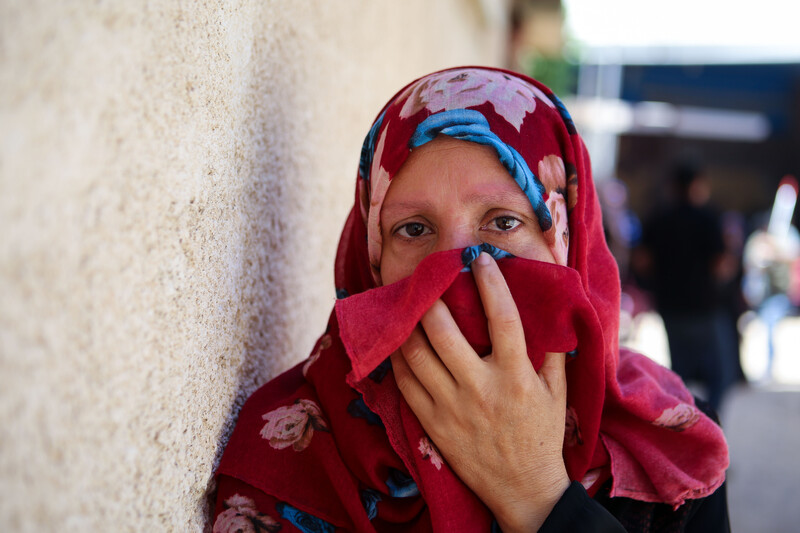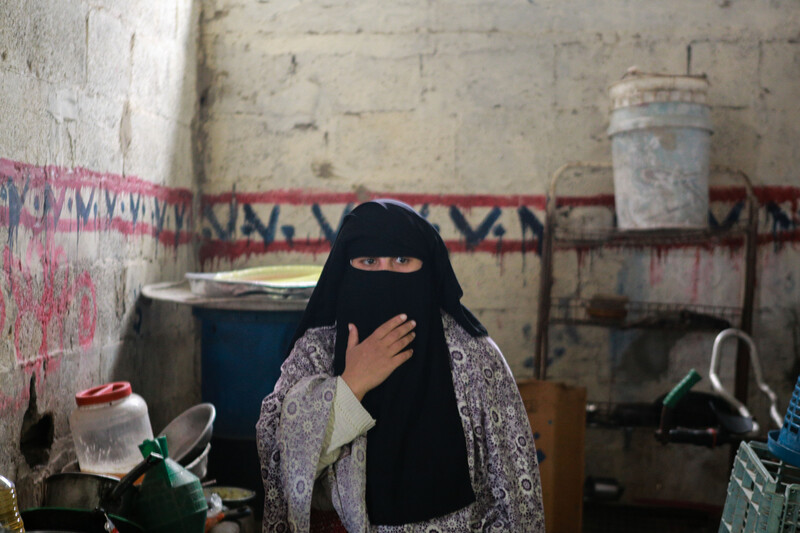The Electronic Intifada 30 September 2019

Nawal Ahmad spent the holidays in prison because she could not repay debts incurred for her husband’s pain medicine.
This year, Nawal Ahmad could not spend the holiday at the end of Ramadan with her five children.
Ahmad, 42, spent two months in prison in northern Gaza after failing to pay debts incurred for her husband’s pain medicine – he suffers from a slipped disc – to a local pharmacy in the al-Salateen neighborhood of Beit Lahiya where she lives with her family.
The debts amounted to around $420. And having failed to secure the necessary drugs through the health ministry, Ahmad was relying on charities to cover the costs.
Some of these charities had covered her husband’s medical costs in the past, but when the time came this time, no one stepped in to pay the pharmacy. Only after two months in prison did a benefactor – who was never identified but paid a number of people’s debt as zakat – obligatory charity, the third pillar of Islam – pay off her debts, allowing her to return home.
“What could I do?” she asked The Electronic Intifada. “My husband is 55 and unemployed. He can’t move for pain or sign any paper. I hoped the charities would help.”
Ahmad is not alone to have gone to what in effect is debtors’ prison.
Recent years have been cruel for the people of Gaza. Three major Israeli military offensives since 2008 have left Gaza’s critical infrastructure – electricity networks, sewage systems and housing – on the brink of collapse, prompting warnings from the United Nations that the coastal strip of land could become uninhabitable by 2020.
A blockade on the impoverished coastal territory that is enforced primarily by Israel but observed also by Egypt, has seen reconstruction efforts hampered, and businesses and industries fail.
With an unemployment rate at over 50 percent and poverty afflicting just under half Gaza’s two million-strong population, people are increasingly and inevitably slipping into deeper debt.
Clampdown
Gaza’s authorities have been uncertain how to handle the problem.
Until last year, the Hamas-led government was not shy of throwing people in jail for unpaid debts. According to, Ayman al-Batniji, the spokesperson for the police in Gaza, just under 100,000 detention orders were issued against factory owners, citizens, and entrepreneurs in 2017, who had fallen into debt or lost their businesses.
According to al-Batniji, about half of those were actually arrested, though most were quickly released.
In 2018, Gaza’s authorities lessened the sanction for falling into financial arrears due to the harsh economic circumstances in Gaza. However, economic circumstances have not improved in 2019.
Al-Batniji did not offer specific numbers for women in prison, but said the police had gone easy on women in the past. Nevertheless, he said, they had had no choice this year.
“We don’t like to jail women on financial charges. However, this year we couldn’t avoid it, due to the huge number of complaints [against female debtors].”

Samah Nour went to prison because she couldn’t service her family’s debt.
Samah Nour, 40, was imprisoned for 10 days in June. Her husband had himself been arrested seven times over four months over a debt of $3,000.
Even though he remains an employee of the Palestinian Authority in the occupied West Bank – which ordered its employees to stay home after Hamas ousted Fatah forces from Gaza in 2007 – the former police officer is now only being paid 50 percent of his salary and cannot meet repayments.
The family has struggled and Nour had to sign off on a debt to the local supermarket that over six months had run up to a $2,300 debt. Her inability to service that debt landed her behind bars.
“We had to borrow money to feed our children. My husband and I slept many nights hungry to secure food for our children; sometimes we just had one meal,” Nour told The Electronic Intifada.
Nour lamented the decline of Gaza’s middle class, which, she said, has all but disappeared. The only reason she eventually got out of jail was that her brother scraped together enough to pay an installment to the supermarket owner.
Um Samir, 45, from the Jabaliya refugee camp in the northern Gaza Strip, spent a month in jail for failing to pay a medical supply shop after she bought a specialized hospital bed for her husband who suffers from a slipped disc.
With Gaza’s medical resources overstretched and underfunded, there is a long waiting time for operations of the kind patients like Um Samir’s husband needs for a slipped disc. This can leave sufferers in pain and incapacitated for many months.
Unable to service her debt, Um Samir – who did not want to give her real name for this article – was arrested in May.
Campaigning to release prisoners
According to Um Samir, the arrests tend to hurt the disenfranchised the most.
“A huge number of authority and Gaza government officials are in debt,” she told The Electronic Intifada. “But it is we the poor who are the most affected. Debtors need guarantees. Some women were obliged to put their names down as guarantors. As a result, many women found themselves in prison, when the time came and they couldn’t pay.”
Um Samir was released after an anonymous donation paid off her entire debt of nearly $560.
The donation came after an online appeal and campaign by Fahmi Shurrab, a lecturer in political science at the Ummah Open University.
Shurrab launched his campaign in April, just ahead of Ramadan, urging anyone who could to help “bring some happiness to the families” of prisoners.
“I found women imprisoned having fallen into debt to get food or medicine for their families,” Shurrab told The Electronic Intifada. “It’s not right. It’s painful that children should see their mothers in jail.”
He had also been moved personally when a neighbor was found dead the morning after a night he had spent worrying about a debt he couldn’t afford to pay back.
So far, the campaign appears to have been a success. Shurrab said he had raised enough money to secure the release of some 100 women and 1,000 men.
Shurrab said most of the donations came from Palestinian donors both inside and outside Palestine.
“I managed with the cooperation of Gaza’s police to get out the most destitute prisoners, especially women.”
Ola Mousa is an artist and writer from Gaza.



